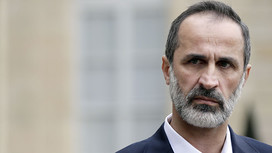11:00AM
Why I'm still in this business
 Monday, December 17, 2012 at 11:00AM
Monday, December 17, 2012 at 11:00AM  FT story on preacher who "unites opponents of Assad."
FT story on preacher who "unites opponents of Assad."
Great quote from the man himself, Moaz al-Khatib:
The international community has been in a slumber, silent and late as it saw the blood of the people bleeding and its children being killed for the last 20 months . . . When the international community intervenes at the right time and when it moves to defend people at the right time it makes societies stable. The wrong international policies have led to extremism. (italics mine)
Yes, I was glad to see Obama recognize the rebels.
Like he said last night about the elementary school shooting, we have to change the way we do things.
All progressivism begins with this question.










Reader Comments (3)
Dr. Barnett,
I would find it beneficial, for my naivety knows no bounds, for you to define what progressivism is. What is the goal of progressivism (not in the gap but in the identity crisis ridden developed economies) and what cost accompany the political reality of a shift towards progressivism.
America's late 19th century progressive agenda was a move away from corporatism, embracing democratic rule from the middle. Progressivism around developed countries today does not seem to have such clear defined objectives and goals. Certainly shrinking the gap and avoiding policies of extremism is critical, but this seems to ignore the realities of the developed world.
Wikipedia does it well:
"Progressivism is a general political philosophy advocating or favoring gradual social, political, and economic reform.[1] Modern Progressivism emerged as part of a more general response to the vast social changes brought by industrialization.
It is left of center in the political spectrum and is to be contrasted with conservatism on the right and the revolutionary left, the former generally resisting changes it advocates and the latter rejecting its gradualism."
To me, it's a belief that government is good, that tackling inequality is good, and that collective self-improvement is the duty of all citizens.
In today's developing world, it would likely involve a move away from state corporations (too easily corrupt), civil service reform, bolstering of the legal system, an embrace of environmentalism, a focus on education and social welfare programs to help workers deal with the disjunctures caused by globalization's rapid advance/churn.
I am disappointed with the Obama "taskforce" on guns. There should be a task force on mental health, which is the primary issue in CT and the US, and CT is an effective "assault rifle ban" state anyway.